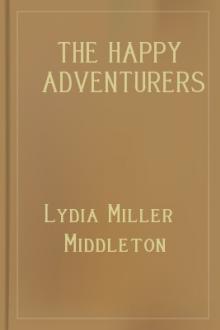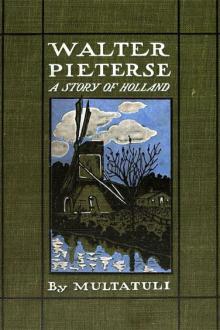Genre Fiction. Page - 181

iginal Dutch settlers. Many ceremonies and customs, relics of aruder age, and now nearly forgotten, were still practised. TheRaymonds, although pious, and more intelligent than most of theirneighbours, kept up many of the usages of Fatherland on the Christmasoccasion, perhaps more as wafting them back in remembrance of earlyenjoyment in the home circle, than from any present love of thefestivity common at this period.
The joyful season drew nigh merrily, and in the watchmaker's family,as in all others--for the very poorest look forward hopingly toit--there was nothing but bright anticipations, which were for thepresent realized. The Christmas cake was prepared in the most approvedold fashion; the dark-hued pine was duly ornamented, and occupied aconspicuous place in the family room, and little William was made mosthappy in the receipt of many gifts, although toy paints and pencilswere not among the number.
But what says the Scripture? "Boast not thyself of to-morrow, for thouknowest not wh

e race has, in general, attainedthrough centuries of experience and moralising. The story becomes aninescapable part of the outfit of received ideas on manners and moralswhich is a necessary possession of the heir of civilisation.
Children do not object to these stories in the least, if the stories aregood ones. They accept them with the relish which nature seems ever tohave for all truly nourishing material. And the little tales are one ofthe media through which we elders may transmit some very slight share ofthe benefit received by us, in turn, from actual or transmittedexperience.
The second kind has no preconceived moral to offer, makes no attempt toaffect judgment or to pass on a standard. It simply presents a pictureof life, usually in fable or poetic image, and says to the hearer,"These things are." The hearer, then, consciously or otherwise, passesjudgment on the facts. His mind says, "These things are good"; or, "Thiswas good, and that, bad"; or, "This thing is desirable," or thec

d as though thegolden floor of heaven had come to rest upon earth. The path, withits sentinel trees, led straight as a rod to a distant house, longand low, surrounded by a vine-covered veranda. There were strange,sweet smells in the air, which felt soft and warm. The sky wasbrilliantly blue, and on the fence across the road a gorgeous parrotsat preening its feathers in the sunshine.
Mollie looked about her with curious eyes, wondering where she was.Not in England, of that she was sure--there was a different feel inthe air, colours were brighter, scents were stronger, and thatradiant parrot would never perch itself so tranquilly upon anEnglish fence.
Then she saw, coming down the path, a girl of about her own age,dressed in a brown-holland overall trimmed with red braid, high tothe throat, and belted round the waist. She wore no hat, and herhair fell over her shoulders in plump brown curls. By her side paceda large dog, a rough-haired black-and-white collie with sagaciousbrown eyes. He lea

at these good folk meant any harm, quite the contrary, they took the girl for the good of her health and her soul.
It so happened that Sal did not know the meaning of the word soul, but it was explained to her. She thought it curious that a certain portion of her body when she died would go to regions far away. If she happened to be good her soul would revel above the blue sky in unrestricted freedom for evermore; if she by any chance turned out badly--well, there was another place where her soul would suffer torments suitable to her misdeeds.
Sal argued this matter out with herself, and commenced to take observations. She saw much in the conduct of her preceptors which caused her to wonder whether their souls were destined for the blue skies or the other place.
Having white blood in her veins, Sal had an imagination far beyond her dull, thick-skulled people. She had a mind and a will of her own. The former suggested to her that she ought to run away from the mission, and the latter carri

now the Inns as Dickens knew them, let us accompany Mr. Pickwick to the Magpie and Stump in search of Mr. Lowten, Mr. Perker's clerk.
"Is Mr. Lowten here, ma'am?" inquired Mr. Pickwick.
"Yes, he is, sir," replied the landlady. "Here, Charley, show the gentleman in to Mr. Lowten."
"The gen'lm'n can't go in just now," said a shambling pot-boy, with a red head, "'cos Mr. Lowten's singin' a comic song, and he'll put him out. He'll be done d'rectly, sir."
Well, you know, respectable solicitors (clerks) don't sing comic songs at public houses nowadays, but that is how Mr. Pickwick found Mr. Lowten.
"Would you like to join us?" said Mr. Lowten, when at length he had finished his comic song and been introduced to Mr. Pickwick. And I am very glad that Mr. Pickwick did join them, as he heard something of the old Inns from old Jack Bamber.
"I have been to-night, gentlemen," said Mr. Pickwick, hoping to start a subject which all the company could take a part in discussing--"I hav

n examined
by some of the best Judges, and is thought qualified
to write them.
His Excellency THOMAS HUTCHINSON, Governor.
The Hon. ANDREW OLIVER, Lieutenant-Governor.
The Hon. Thomas Hubbard, | The Rev. Charles Chauncey, D. D.The Hon. John Erving, | The Rev. Mather Byles, D. D.
The Hon. James Pitts, | The Rev. Ed. Pemberton, D. D.
The Hon. Harrison Gray, | The Rev. Andrew Elliot, D. D.
The Hon. James Bowdoin, | The Rev. Samuel Cooper, D. D.
John Hancock, Esq; | The Rev. Mr. Saumel Mather,
Joseph Green, Esq; | The Rev. Mr. John Moorhead,
Richard Carey, Esq; | Mr. John Wheat ey, her Master.
N. B. The original Attestation, signed by the above Gentlemen,
may be seen by applying to Archibald Bell, Bookseller,
No. 8, Aldgate-Street.
*The Words "following Page," allude to the Contents
of the Manuscript Copy, with are wrote at the
Back of the above Attestation.
P O E M S

popes and cardinals as if they were ordinary fallible people, and made a testament-thief of Walter Pieterse.
To be sure, Glorioso was not to blame for this last, certainly not. One ought to be ashamed to be a hero, or a genius, or even a robber, if on this account one is to be held responsible for all the crimes that may be committed years afterwards in the effort to get possession of one's history.
I myself object to any accusation of complicity in those evil deeds that are committed after my death in quenching the thirst for knowledge of my fate. Indeed, I shall never be deterred from a famous career merely by the thought that some one may sell the New Testament to get hold of the "Life and Deeds of Multatuli."
"You rascal, what are you loitering around here for? If you want anything, come in; if you don't, make yourself scarce."
And now Walter had to go in, or else abandon his cherished Glorioso. But the man who bent over the counter and twisted himself like a crane to open the


